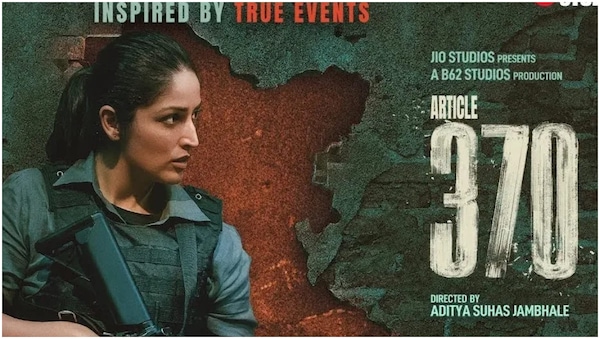Article 370 Review – It’s whispers, not chest thumping anymore with some good filmmaking ft. Yami Gautam and ‘fiction’
The biggest concern Yami Gautam's Article 370 is what is the voice of the film exactly? Read the full review of Article 370

Last Updated: 08.01 AM, Feb 23, 2024
In the wake of passing the bill about the abrogation of Article 370, we see the Home Minister walking into the Rajya Sabha. We are instantly taken back in time when the imbalance in Kashmir began, along with the Pulwama attack and the airstrike that followed, amidst the abrogation chaos. At the center is Zooni, a Kashmiri girl who is fighting for her nation and to find her redemption.
Article 370 Review
Article 370, like writer Aditya Dhar’s last movie around a similar subject with a different theme (Uri: The Surgical Strike), is quite indulgently made with a lens that would invite a wider audience. But the collective failure of an entire clan of movies is when an incident as serious as the Pulwama Attack, which shook us all to the core back in 2016, fails to invoke anything when shown on the screen for the umpteenth time in less than a decade (it’s not even a month since Fighter). Where have we arrived as a community of creative people? What does it say about films like these and this one, which has its marketing about getting away from the word propaganda but tries to juice out everything that says otherwise?
Written by Aditya Dhar, Arjun Dhawan, Aditya Suhas Jambhale, and directed by Jambhale, Article 370 is a movie that is well-structured when it comes to hiding a theme that promotes the current government. There is a good narrative enough to invest you in the storytelling, with what is at stake being something that we have heard about since our childhood, and at the center of it all are two women trying to save an entire nation and one of its most sensitive states. So, the emotional, patriotic, and moral scale of the movie is almost at its peak throughout the runtime.
Jambhale, with his direction, even manages to keep our intrigue on the right track and know how these things were tackled. But what this film, just like Uri: The Surgical Strike, does is that it makes you forget that this is all ‘fiction’, like the disclaimer that flashes on the screen longer than average says. But then how is a movie that imitates every single step that happened in the recent past in our country, with only a few fictional arcs, labeled as creative liberties? Are we using the word fiction so loosely now that we can sell anything under it?
Whether it is a propaganda movie or not is a question best asked to the makers of the movie. But if a lookalike of the current PM of India breaks the fourth wall and says ‘Kashmir ke sath hum aisa nahi hone denge,’ what are we to make of it? Is this the filmmaker talking or someone else? Or when the lookalike of our Home Minister behaves exactly like the existing one, or when the movie almost defends the current status of Kashmir after the restrictions on the internet and other things, what statement are we trying to make?
I am not against the film that also ticks many boxes in good filmmaking; my only concern is what is the voice of the film exactly. Why is it so convoluted and emphasizing specific points like it wants you to see what a specific person has done in his/her tenure and why you should look up to him as God? In a movie about Kashmir, where is the voice of the locals? Why don’t they have any say? If they were kept away from the internet for so long, why are we not shown the cons of it that they suffered? How is the ruling party in the movie only made of wise people with no room for mistakes? White-washing is a term we use very loosely these days, but the ones who use it shouldn’t be blamed for the content we are served most of the time.
Article 370 is very convenient when it dilutes some things so much to get them registered concretely in your heads, as it shows. Lip-sync shows how a couple of things were censored and redubbed later. If that isn’t enough, the end recreates another 30-year-old picture of the existing PM to show the God figure he is according to the makers. Amid all of this is an earnest Yami Gautam who is trying her level best and even succeeding in the most part of it. What stands out is when she is completely lost when taken away from her job, and how her silence does speak. Priyamani is quite natural, but her character is a safe play for the makers to make her the mouthpiece to the PM because she, out of all of them, is ‘fictional’.
The cinematography by Siddharth Vasani is quite good and adds a lot to the experience (the good part of it). The wife frames he creates are very visually luring, and the action shots are well-planned. The music is average and doesn’t stand out.
Article 370 – Final Verdict
The PMO in his rallies is promoting this film that the filmmakers have denied being propaganda-driven. We are not one to tell you how you should look at it, but we really want you to watch it with the word ‘fiction’ in your mind. Make wise decisions.
Subscribe to our newsletter for top content, delivered fast.

